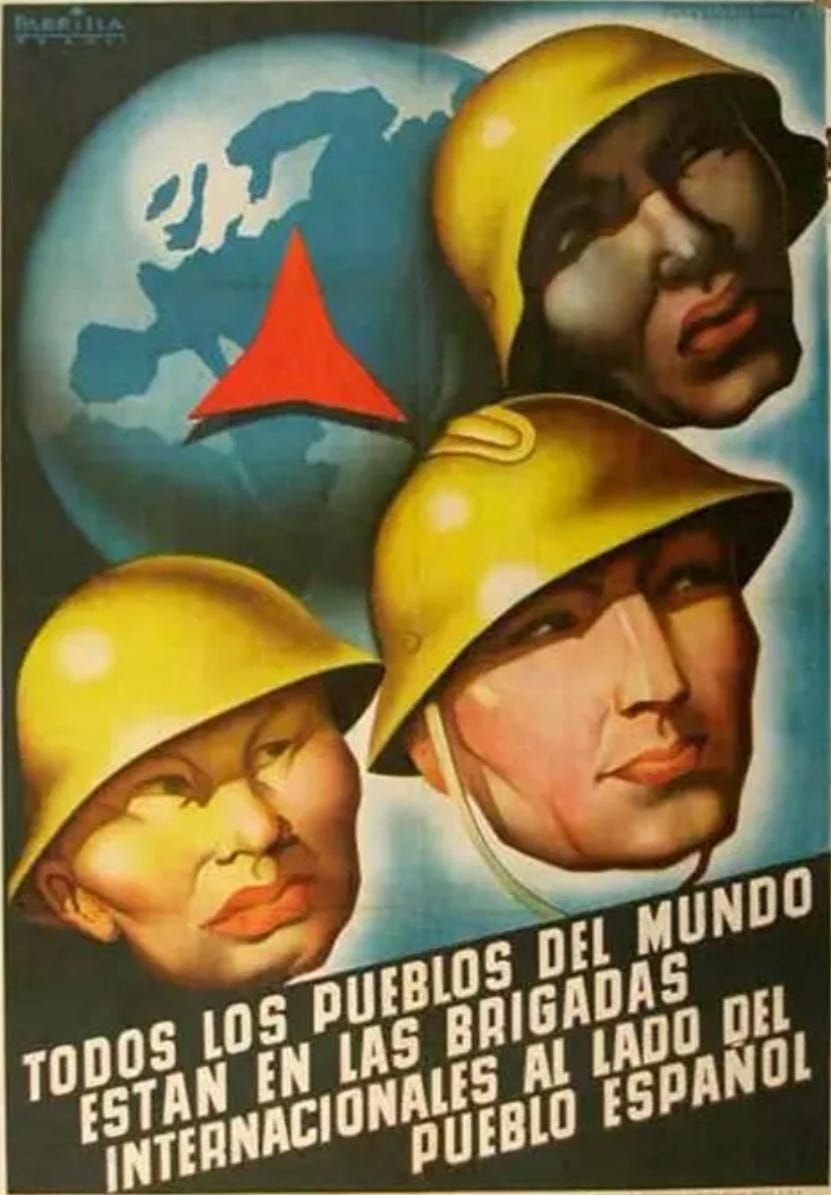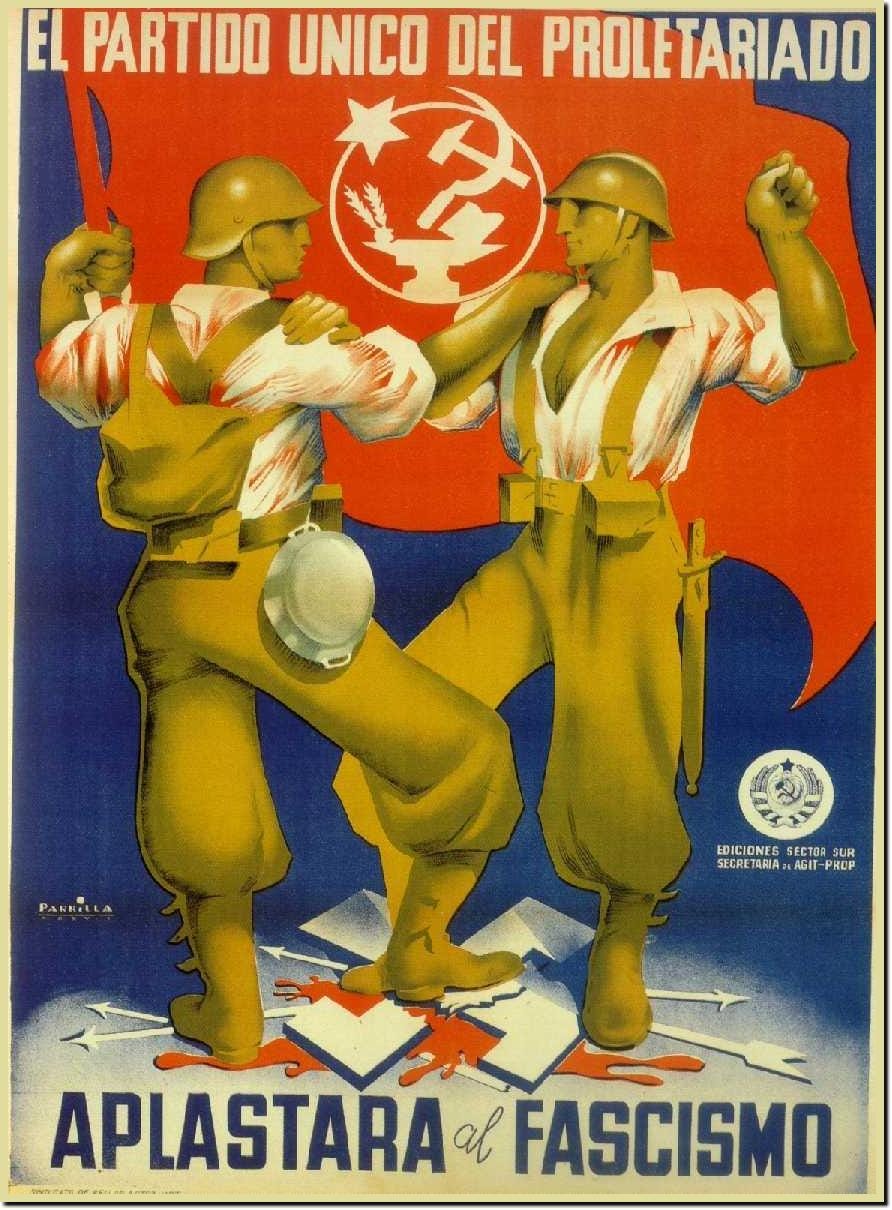

In April 15th, 1920, the National Committee of the Federation of Socialist Youths met in Madrid to, taking the initiative over the PSOE, take the decision of joining the Third International, founded by the Bolshevik party. After a convoluted process that lasted until the 14th of November of 1921, the Communist Party of Spain (Spanish Section of the Communist International) was born, pejoratively called "The party of the 100 children" by its opponents.
The Komintern's policy in its early days was one of the "only front", stating that capital could only be beat via the united effort of all communists in all spheres of life. Its motto became "Towards the Masses!". In Spain, this period was marked by Primo de Rivera's dictatorship between 1923 and 1930, during which almost every political group was banned. The social-democratic PSOE and UGT avoided this by remaining "neutral" towards the dictatorship. Some members of the PSOE even collaborated, like Largo Caballero, who became Rivera's Minister of State. The Communist Party maintained its sole struggle during this time, gaining popularity among the Spanish proletariat.
When the dictatorship ended and the Second Republic was proclaimed in April of 1932, in the midst of the effects of the 1929 capitalist crisis, the 1931 strike in Sevilla and 1932 general strike, the PCE had found itself unable to work outside the dynamics imposed by the dictatorship's repression, and only began to regain its force after the selection of José Diaz as general secretary in September of 1932. The party corrected some of the left-communist and sectarian mistakes that characterized the period of the dictatorship.
The PCE took on an even bigger role in the organization of our class after its crucial role in the October insurrection of 1934 in Asturias, during which the proletariat took power in the mining basin and most of Oviedo, via the Peasant and Worker Alliances, expressions of the aforementioned only front strategy decided by the Third International. The government of the Second Republic, carrying out the needs of a section of the Spanish bourgeoisie, brutally repressed the Asturian revolutionaries, with general Francisco Franco at the helm of the military's intervention. Among the victims was Aida Lafuente, a militant of the Communist Youth and an example of bravery.
This glimmer of worker power was contextualized in the Black Biennium (1933-1935), a period of the Republic when reactionaries accessed the government and expressed the most violent tendencies of the Spanish bourgeoisie against the more than 30,000 political prisoners they took, and against the rapidly developing workers' movement.
It was during this time in Spain and the whole world, when the Third International identified the generalized rise of fascism and reactionarism, and adopted in its 7th Congress, during the summer of 1935, the policy of the Popular Front, failing to link the anti-fascist struggle with the struggle for workers' power, instead advocating for alliances with "socialist" parties and other bourgeois-democratic parties, placing the fight for socialism-communism in the background.
Half a year after this decision, the Popular Front alliance won the elections in the 16th of February, 1936. Shortly after, and only a year after the 7th Congress, sections of the Spanish and international bourgeoisie countered this victory with a failed coup d'etat by fascist generals in the 18th of July, 1936. They had the backing of the nazi-fascist powers in Europe and the complicity of the "democratic" capitalist powers, who were anxious about the strengthening proletariat in Spain. Curiously, the plane that carried Franco from his exile in the African colonies to Tetuán in north Africa, the Dragon Rapide, originally took off from London.
The biggest supporter of the Spanish Republic was the USSR, that, through the enormous effort of the Third International and the Communist Parties in 52 countries, against the banning of volunteering by many of those 52 countries, organized the enlistment, falsification of documents, logistics, arrival and other matters for the arrival of around 35,000 workers, peasants and intellectuals from all over the world. Under the single banner of the International Brigades, and for the first time materializing the historic slogan Workers of the World, Unite!, the Volunteers of Liberty, as they also came to be known, gave their mind and their body to the cause of the Spanish people, armed with the teachings of marxism-leninism. They knew that it was no longer a fight for only the Spanish. As J. V. Stalin put it in October of 1936:
The workers of the Soviet Union are merely carrying out their duty in giving help within their power to the revolutionary masses of Spain. They are aware that the liberation of Spain from the yoke of fascist reactionaries is not a private affair of the Spanish people but the common cause of the whole of advanced and progressive mankind.
-Telegram from the Central Committee of the C.P.S.U.(B) to the Central Committee of the Communist Party of Spain, 16-oct-36
In July of 1936 there already were Brigadiers present in Spain, for the occasion of the Popular Olympics (in boycott of the Berlin Olympics) organized by the Red Sport International and the Socialist Worker Sport International in Barcelona, they were among the first to take up arms against the coup d'etat. The Executive Committee's Secretariat of the Third International formalized in the 18th and 19th of September the creation of the International Brigades, which began to arrive in Spain the 14th of October of 1936. Despite the propaganda levied by fascists and bourgeois historiography, the importance of the International Brigades is undeniable today.
After the integration of the Brigades into the Popular Militias in the 22nd of October, the Brigadiers began their training in Albacete and saw action for the first time the 8th of November in Madrid, with the 11th and 12th Brigade. Militarily, the Brigades were present and indispensable in every major battle of the war, but they also played a moral role. After every capitalist power had abandoned the Spanish people to their fate with the policy of non-intervention, the compact and disciplined columns that marched through the streets of Madrid singing songs like The Internationale, Young Guard, or The Marseillaise, made up of workers who barely knew the language but were willing to make the ultimate sacrifice, decidedly improved the morale of every militia and civilian in Madrid and in Spain.
But even greater than the support of the Brigades were the more than 300,000 strong military detachments sent by Germany and Italy, with the implicit approval of capitalist democracies, including the Popular Front in France, whose efforts of non-intervention focused exclusively on the republic. And it was the strategy of the popular front that forced the PCE to sideline the revolutionary potential of the hundreds of thousands of militants, instead preserving the legitimacy of the bourgeois republic.
By 1938, the republic was on its last legs and, wishing to evidence the foreign involvement on the fascist side, declared to the League of Nations in the 21st of September that they would disband all volunteers enlisted after the 18th of July, 1936. The 16th of October, 2 years and 2 days after the arrival of the Brigades, the League of Nations' International Committee arrived in Spain to verify the disbandment and departure of the Brigadiers. No such inspection was ever made on the fascist side.
According to the International Committee's report published on the 18th of January, 1939, there were a total of 12,673 Brigadiers in Spain, less than half of the total number of volunteers at around 35,000. They began to depart Spain on the 2nd of November, 1938, through the French border. During the process of departures, some Brigadiers were murdered in Spain, others died protecting the fleeing republicans and hundreds of thousands of refugees at the crossing in France. This was when Mexico, and especially the Communist Party of Mexico which pressured the government, took on around 1,600 brigadiers, mainly Germans, Poles, Italians, Austrians, Czechoslovaks and Yugoslavians, who could not safely return to their homes due to the advance of fascism within their countries. The debt owed by the workers of the world, especially the Spanish, to the Communist Party of Mexico is immeasurable, along with every other Communist Party that helped and the Third International.
The dissolution of the International Brigades did not achieve the result desired by the Republic. Instead, their retreat towards the end of the Battle of the Ebro only accelerated the morale defeat of the republican militias. Most of the brigadiers who survived the war but could not be repatriated in time did not have a pleasant fate. Most of those ended up in the French concentration camps of Gurs, Argèles-sur-Mer, Saint-Cyprien and Barcarès, Septfonds, Riversaltes, or Vernet d'Ariège.
Their fight was not in vein. The experience gained by the few who survived at a high cost proved essential in the development of their own parties, and soon enough, anti-fascist resistance. Everywhere that people took up arms against the fascist occupation, whether inside or outside the concentration camps, ex-Brigadiers were present, continuing the fight they started in the 18th of July, 1936, well after the war that had began that day was history.
Back in Spain, while the moribund republic thrashed for the last few times, the bourgeois republican government, headed by the social-democrat Juan Negrín, began to isolate the PCE with the support of the trotskyists and anarchists. It came to a close after the coup d'etat by the republican general Casado, during and after which the communist militancy was oppressed, and the fascist fifth column that had remained in Madrid opened its gates to the fascist military. This is how the fascist dictatorship began in Spain, with a betrayal by the Popular Front's social-democrats and by the democratic-bourgeois powers of the world. They couldn't help but mirror the collaborationism happening on the world stage; the UK was actively looking for an alliance with Germany, and every other capitalist country was making business with the looted property. All for one purpose that united them; the destruction of workers' power in the form of the marxist-leninist parties that around the world were beginning to challenge the capitalists, with the Third International at the helm.
These are the lessons that Spain and the world learnt during and after its fierce resistance against fascism. No popular front with bourgeois-democrats is sustainable, and their class character will always prevail above the superficial differences with fascism. The only viable tool is the organization of the social majority within the Communist Party, with proletarian internationalism and an altruist disposition as principles. No matter how much social-democracy may fear fascist privatization, and no matter how much they disrespect bourgeois democracy, the class interests that guide them will always prevail when faced with a capable mass of organized workers.
The progressive Popular Front in France, the "appeasing" government in the UK, and the nominally anti-violence liberal democracies, did not ever attempt to do anything else than giving carte blanche to the fascists and hindering their rivals. The betrayal of Spain, Austria, Czechoslovakia and Poland were all made with the same reasoning: the alliance with fascism to destroy communism. There are no reasons that make the opposite possible today. When reactionarism picks up traction in lockstep with the deepening capitalist crises, all of these bourgeois-democrats some "leftists" like to place their hope in will not vary substantially from the script they followed 85 years ago.
The workers of the Soviet Union are merely carrying out their duty in giving help within their power to the revolutionary masses of Spain. They are aware that the liberation of Spain from the yoke of fascist reactionaries is not a private affair of the Spanish people but the common cause of the whole of advanced and progressive mankind.
-Rafael Alberti, A las Brigadas Internacionales, dec-36

